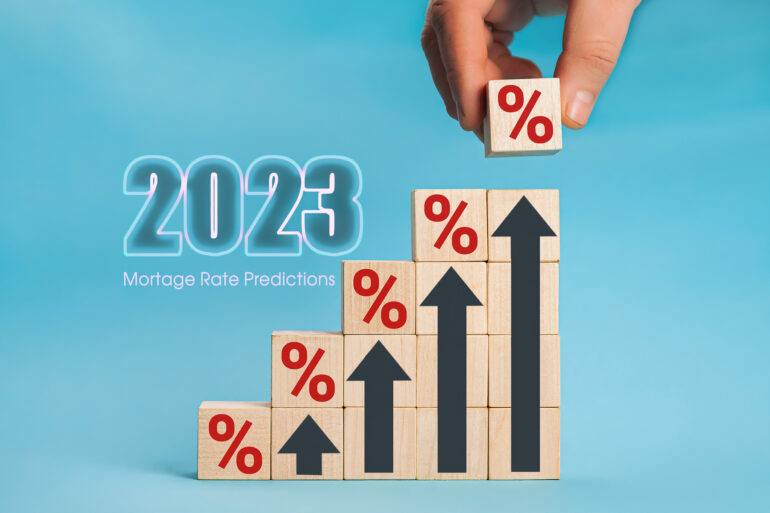Mortgage Rate Predictions for 2023
It is always so difficult to predict economic indicators which can affect mortgage rates for the next year. My crystal ball sometimes fails me, so we have to look at actual statistics, facts, and industry expert opinions to make a more grounded mortgage rate prediction for 2023.
How Rates Have Changed in 2022 (So Far)
The Federal Open Market Committee sets the short-term interest rates, known as the federal fund rate, that banks use when people want to borrow money from them, especially mortgages. The federal fund rate doesn’t directly affect long-term rates, including mortgages, but the two tend to go hand in hand.
After the Fed’s rate hike in June of 2022, mortgage rates increased to 5.78% for a 30-year fixed-rate mortgage and 4.81% for 15 years. Freddie Mac (the Federal Home Loan Mortgage Corporation) said the 30-year rate jump marked the largest one week increase in their survey since 1987, adding that higher rates are the result of a shift in expectations about inflation and the course of monetary policy. Further increases are expected in July as well, looking my crystal ball it will be big, at least a .5 jump or as much as .75 if things stay the same with inflation indicators.
“Mortgage rates have ratcheted up dramatically over the past few months, and historically such large movements have ended with a housing slowdown,” said Doug Duncan, Fannie Mae SVP and chief economist.
Consumers Fear High Rates in Coming Years
The consensus is that the current rise in mortgage rates is here to stay, 2023 mortgage rates will rise, and they will steadily increase over the next three years. Rates are expected to reach 6.7% by 2023 and 8.2% by 2025, according to a housing survey released by the New York Federal Reserve. If this comes to fruition, it would be the first time the average 30-year rate crosses 8% since 2000.
It’s easy to understand why people have an expectation of mortgage rates rising consistently when the rate has been climbing steeply since April 2022.
“The possibility of mortgage rates increasing that high exists, of course. However, an 8% interest rate by 2023 is unlikely,” says Ralph Mclaughlin, chief economist at Kukhan, a real estate and data analytics firm.
Experts Think Mortgage Rate Increases Will Slow
While consumers may be mentally preparing themselves for higher rates over the next few years, industry experts are more restrained in their expectations. The National Association of Realtors (NAR) forecasts that the 30-year average 2023 mortgage rate will be between 5% and 5.5% throughout the majority of 2023.
Lawrence Yun, NAR’s chief economist, states, “as the Fed raises interest rates, the mortgage market will simply yawn.” He suggests that the mortgage market has already factored in all the possible Fed rate hikes. NAR does not currently have a forecast out to 2025, but Yun expects 2023 mortgage rates to stabilize around 5.5% into 2023.
Other mortgage industry experts seem to agree that consumers’ fears that rates will rocket sky high will be abated. The Mortgage Bankers Association expects rates to average 4.8% by the end of this year and to decrease to an average of 4.6% by 2024. This is based on a forecasted decrease of stabilizing yields on the 10-year treasury note, which are closely tied to mortgage rates. The MBA expects the yields to steady at 2.8% and hold through 2024.
Matthew Pointon, senior property economist at Capital Economics, says mortgage rates are set to rise to 6.5% heading into 2023. “Assuming house price growth follows our previous forecast and slows to zero by mid-2023, that profile for interest rates would leave mortgage payments above their mid-2000s peak until mid-2023.
“We expect lower home demand to lead to a relatively small fall in house prices, with annual growth dropping to -5% (year over year) by mid-2023. That would bring the mortgage payment burden back under the mid-2000s level by the start of 2023.”
From a prestigious real estate company’s perspective, Melissa Cohn, regional VP at William Raveis Mortgage, believes the only way 2023 mortgage rates might go up to 8% is if the Federal Reserve’s current plans to fight inflation have no effect. This could cause the Fed to then raise short-term rates to levels not seen in years.
She adds, “it is possible that mortgage rates could get to 8%, but at that level, the economy will certainly cool off and when that happens rates will come back down to affordable levels.”
What Influences Mortgage Rates?
The Fed does not directly set mortgage rates, but it does influence them by establishing monetary policy to control inflation and keep the job market running smoothly. One of the main tools to do this is the federal funds rate — a short-term rate banks charge each other. As this rate goes up, so do mortgage rates. If inflation is not kept under control within the next year, this could influence interest rates, ultimately increasing the 2023 mortgage rates.
Ongoing inflation is a huge concern for investors as it has an automatic impact on mortgage rates and the economy. The Fed uses different monetary policies to tame ongoing inflation, which influences interest rates. High interest rates shift the affordability of a mortgage, making them inaccessible to many homebuyers.
The Federal Reserve’s indications suggest allowing mortgage-backed securities (MBS) to runoff. This involves leaving maturing MBS assets to expire, therefore easing the upward pressure on interest rates.
External influences such as the Ukraine/Russia conflict have a huge effect on the global economy. The trade standoffs with China also create difficult market conditions that will continue to have an impact on the global economy.
Market conditions are very volatile, therefore causing an increase in interest rates to compensate for lost market influence. These impacts affect monetary policy, causing a shift in the supply chain and extreme labor costs.
2023 Mortgage Rates May Remain Steady
Like anything else, it is hard to predict the future, but based on the data it is likely that interest rates won’t fall anytime soon. Even if the rises in interest rates are small, it will ultimately have a knock-on effect for the mortgage market. As all you investors out there are only too aware, this can create some stellar opportunities for your long-term purchasing strategy for foreclosure properties.
You may change your strategy to renting out your “doors” as opposed to flipping. That potential buyer may want to become a renter in the short term, as mortgage rates become too onerous for them, so in the short term there could be some excellent passive income opportunities for you moving forward.
Even in the high mortgage interest rate market of the 80s and early 90s, investors created generational wealth in real estate. Mortgage rates might soar in 2023 and even into 2024, but that shouldn’t stop you from investing in real estate. Prediction: 2023 mortgage rates will remain higher in the 6.2% – 6.9% range.








